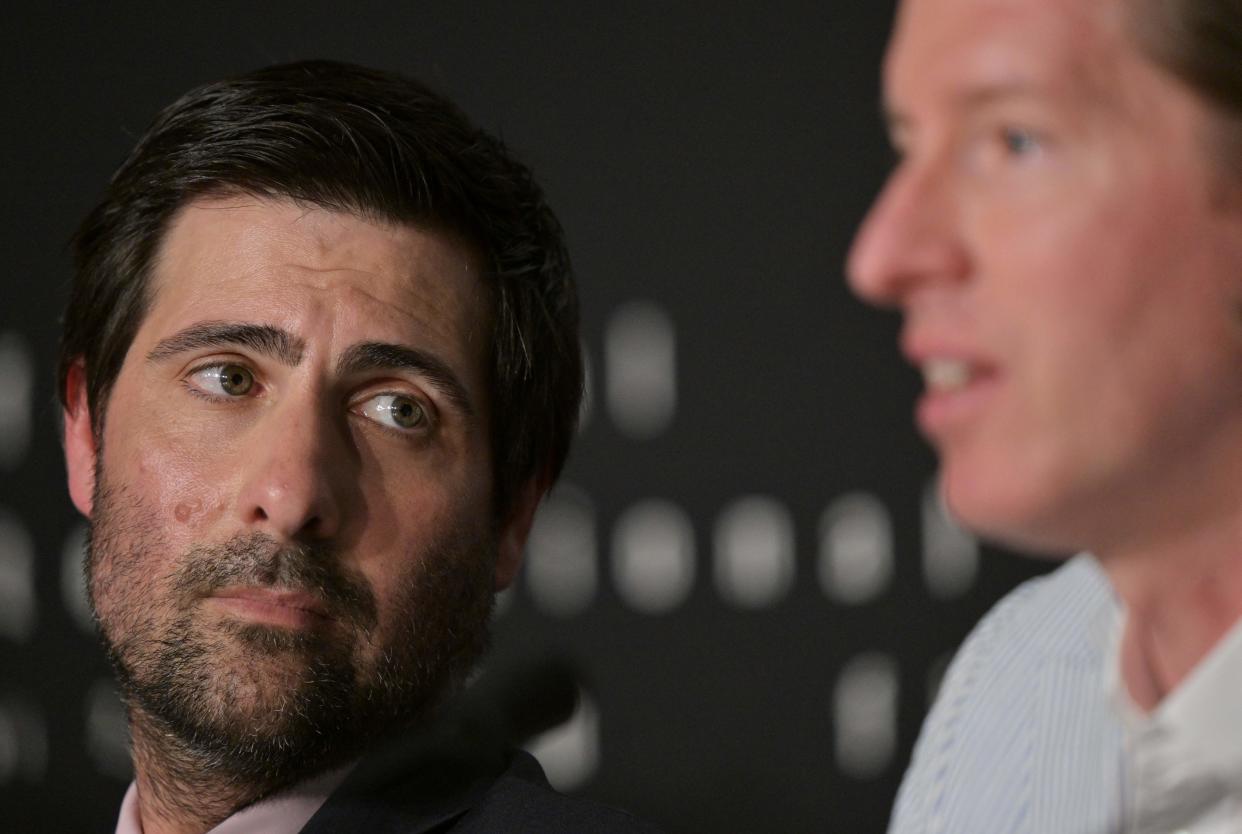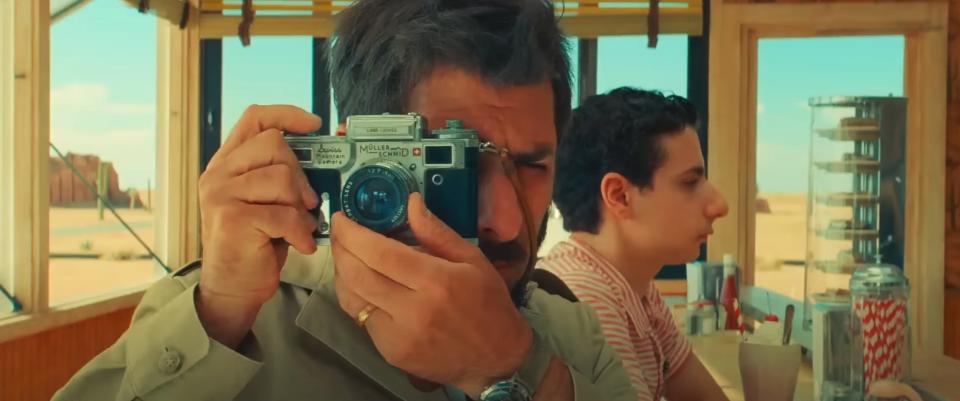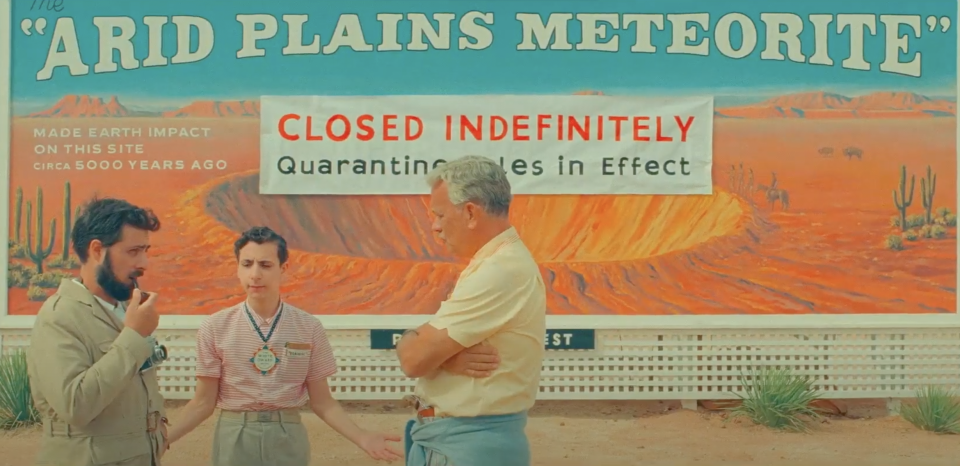Jason Schwartzman: How Wes Anderson’s ‘Asteroid City’ Helped Me Revisit the Grief in My Life

- Oops!Something went wrong.Please try again later.
Editor’s note: In “Asteroid City,” Jason Schwartzman plays Augie Steenbeck, a war photographer who has to break the news to his kids that their mother has died. He also plays Jones Hall, an actor portraying Augie in a play. This complex gamble brought a new dimension to Schwartzman’s longstanding relationship with Wes Anderson nearly 25 years after the director cast Schwartzman in “Rushmore” at the age of 19 and launched his career.
Here, Schwartzman explains the personal revelations that came out of the experience. “Asteroid City” is now in theaters.
More from IndieWire
As 'The Flash' Collapses, This Weekend Set the Wrong Kind of Box-Office Record
'Asteroid City' Channeled 'Bad Day at Black Rock' for Its '50s Desert Town - Down to the Tar Paper
There’s a moment in “Asteroid City” when my character, Augie, reveals to his children that their mother is dead, that she’s been dead for three weeks, and they’re moving away. That’s almost exactly what happened to my father and my uncle when they were kids. They lost their mother to breast cancer and my grandfather packed them up in Brooklyn and they drove across the country to California and didn’t find out that their mother had died until a few weeks later, after they had settled. It was a sad coincidence. So when I read that part, it was eerie, like my dad was a part of the scene. It was very emotional.
When my own father passed away, my mother said, “Remember, there’s no wrong way to feel.” I was 13 at the time and didn’t get it — but “Asteroid City” helped me understand what she meant.
At one point, Margot Robbie’s character tells mine that I have to keep going, and I realized that Wes was making this really intense observation about grief: It’s OK to feel bad, it’s OK to feel good, and it’s OK to then feel bad again. It moves forward and back, because that’s what this emotion is about; you can’t keep judging it. Don’t feel bad about not being sad in a bad situation. You’re judging it so you’re not even experiencing it. If everyone else is crying and you don’t feel guilty for not being visibly upset…don’t ask yourself why you aren’t feeling sad enough…don’t judge your emotions. I think this is what my mom meant when she told me there was no wrong way to feel after my father passed away. That was the most personal aspect of all this, but I didn’t even get it until I watched the movie.
Wes has seen me through a lot. Over the years, we’ve lost people, we’ve gained people, and we’ve seen all kinds of versions of ourselves. Working on these projects is just about sharing stuff. He called me in 2019 and said he was working on something with Roman Coppola with a part they were writing for me. I couldn’t believe it. The last few projects I had worked on with Wes and Roman were more in the “cooking story and character” phase. I hadn’t acted with Wes in a little while, but didn’t realize that until he brought this film up, and the feeling of joy sort of occurred through me. I had forgotten what that felt like, because our friendship is so based around enthusiasm for other people. At a young age, he was showing me movies, music, and books. Nobody had really done that for me before; I had no one in that role.

Part of the delight in working with him is seeing how excited he is to write for that person and to imagine what that person is going to say. I’ve watched his glee and excitement over the last few years: “Oh my gosh, Jeffrey Wright saying this is going to be amazing!” So all of a sudden, it was like, “Wow — he’s thinking of me again.”
At first, Wes said, “All I can say right now is think about Kazan.” Oddly enough, I had this book about Kazan next to my bed, so I texted a photo of it to him. Then, after Wes called, I went to Chicago to act in “Fargo.” While there, I went to the Music Box Theater because they had “2001” on 70mm playing one weekend — which sent me down a little Kubrick rabbit hole, watching clips and documentaries and reading books. Then Wes writes me again out of nowhere and says, “Pause on Kazan, don’t think about Kazan, think about Kubrick!” Beside me this time was the book “Kubrick” by Michael Herr. I sent him that photo, too. I still had no idea what the movie was about; I thought maybe I’d play a director. I just thought it was neat to be somehow , in some way, on a parallel play with the guys.
A year later, “Fargo” was put on hiatus because of the pandemic. When we had been making it, there was a dialogue coach named Tanera Marshall who was working with the actors Ben Whishaw and Jesse Buckley on specific accents. While I was on the set, I said to Tanera, “Hey I don’t have lines I can practice with you from the script or much information, but if I was to say with you that I wanted to try a character from the time of Kazan or Kubrick, what would that mean?”
She said, “You’re talking about an era of people — one’s European, the other New York.” Then the script came and there was a line in it that said my character “speaks with a faint accent.” The script took place in the 1950s, which would’ve placed me in a similar generation as my own father, who was from the East Coast. I had never played a role that lined up with my father before, so I went to mom’s house on the weekend and rummaged through old videos of my family. There was no cable to watch these videos. I found the exact camera he used on eBay just so I could play these videos on my TV. Since my dad was filming it all, I was just trying to get a clip of his voice. There was something specific about the way he talked.
I kept trying to figure out this character and Tanera said I had to learn how to move my face less, which is very hard. Then, one day, I walked past my wife sitting in the kitchen. I said something and she didn’t really respond to it; she just made a sound. I walked over and said, “What?” She pointed to her face and she had one of those re-hydrating skin masks on that hardens. I was like, “Wait a minute, that’s what I want to feel like!”
I got all this facial hydrating clay onto my face. It was probably way too much. Before you knew it, my face couldn’t move. Then I took out my script and I tried to do all the lines with this mask on my face. I thought it was really fun and exciting, so I sent Wes a video. He wrote back and said, “I think we’re on to something.”

Wes and I asked Julie Dartnell, the head of hair and make-up, if there was some topical face numbing cream that I could use, or something else that might constrict my facial movement. I was thinking of something along the lines of numbing the actual muscles, but Julie had the great idea for a dental prosthetic device. She knew an FX person in the UK who essentially made me a tiny mouthguard just for the molars, which went over my teeth — just one little square for your back molar that clicks both of them together so it basically locks your jaw shut. I popped it in and couldn’t move my mouth. I decided to use it for a few weeks to help my process. Then Wes told me to take my voice down a little; I was at about a B-flat, and Tanera would do these voice exercises with me to get me to a G. It was incredible.
Since the character was also at war, this whole experience made me think how a person who’s seen a lot of death and trauma learns to deal with it when it happens in their own family. Augie literally doesn’t know how to move. It’s a physical display of how uncomfortable it is, how hard it, to talk about these things. I was left thinking about what the life ahead for these kids might be like, and I thought about my own kids.
The best part about being around Wes is that he sees something in me that I don’t see. That’s what friends do — they push each other when they don’t have anywhere else to go. It’s the privilege and responsibility of someone you’ve known a long time: They are able to see you and also see more of you.
As told to Eric Kohn.
Best of IndieWire
Where to Watch This Week's New Movies, from an Expanding 'Asteroid City' to 'No Hard Feelings'
31 Queer and Homoerotic Horror Movies, from 'Psycho' and 'Hellraiser' to 'Fear Street' and 'Titane'
Sign up for Indiewire's Newsletter. For the latest news, follow us on Facebook, Twitter, and Instagram.

